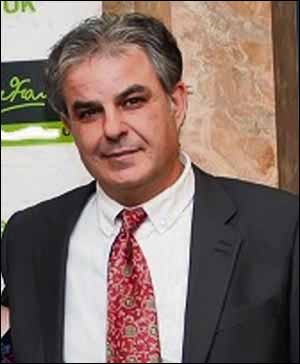| PROFILE Commando Elon fights Israel’s new PR battle | |
WHEN I spoke to Israeli-born journalist and ex-commando Elon Perry this week, he had just been to Downing Street, where he had been fighting Israel’s case. But Elon has not always been so pro-Israel. When he was a student, he blamed his grandfather David Ifrah for taking his family away from a wealthy life in Morocco to Netivot, where – a mile from the Gaza border – Elon’s childhood was constantly traumatised by terror attacks. Ifrah, who was the mayor and judge of the Moroccan town of Azilal, was one of King Mohammed V’s closest advisers. When in 1955, for Zionist reasons, Ifrah decided to take his family to Israel, the king voiced his displeasure. Elon, who was born two years later in Netivot, recalled the story. “The king was offended,” he said. “He called my grandfather to come to him immediately. “My grandfather left everything on Shabbat and walked six miles to the king. But my grandfather still took his daughter, my mother, Zohara, who was only about 20, her new husband and their baby to Israel. “My father was very upset because he had leather factories in Morocco. They had a good life there with maids and big houses. They lived in a villa on the beach, a very successful life.” All that was in sharp contrast to life in Netivot, where, from the age of three, Elon spent all his childhood and youth under fire. He said: “We always experienced terrorist attacks from tanks and bombs. My father, who was a border guard on the dangerous Gaza border, tackled a terrorist with his bare hands at the back of our house. He was a very brave man.” But young Elon was not so brave. “I remember all the time bombs, terror attacks and shelters,” he said. “That was my childhood. I was traumatised as a child. I used to wet my bed and cry a lot. The same happened to all our generation. Some of our class didn’t make it. They became crazy or sick. One committed suicide. “We couldn’t even go out to play football. We were always attacked.” To escape from the trauma, Elon drummed in a rock band from the age of 12 to 18. After excelling in high school, he decided to take his revenge on the terrorists, who had traumatised his childhood, by joining the elite Golani commando unit, which played a crucial role in squashing the First Intifada and during the war in Lebanon of 1982. Elon said: “I joined the commando elite to take revenge. During my army service I became a man. “We never said no to any operation. We did the most dangerous things in Lebanon and Gaza, really dangerous stuff that you see in movies. We always volunteered for really crazy stuff. “The motivation was so high. I got wounded twice. My respiratory system was damaged by explosives in Lebanon.” Working as an Israeli journalist and running his own TV production company, Elon continued to serve for 25 years in the IDF reserves. It was during his reserve duty in Gaza that Elon became aware of Israel’s extremely poor public relations. He recalled: “When I was a soldier serving in Gaza, we had been ordered to take shelter in the back of a hospital. “We saw Palestinian kids covered in blood rushing into the hospital from an ambulance. At the back of the hospital the children took off their T-shirts which had been covered in ketchup.” Elon reported the incident to his government’s public relations department, but they did nothing about it. However Italian journalists took up the story as did Elon, who broadcast and wrote about it. Later at a press conference, Elon asked Israeli Prime Minister Benjamin Netanyahu why Israel did not invest in better public relations. The PM’s answer was: “It won’t help. They will hate us anyway.” Elon calls this attitude “arrogant”. He said: “The Palestinians are winning the war because of the lack of Israeli propaganda which stems from arrogance. “The Palestinians are stubborn. I don’t think they want peace. It’s better for them to keep their jobs and to be seen as victims. The Palestinians look good in the eyes of the world who like to embrace victims. “They know how to do it very well. They can win more that way.” He predicted: “This conflict will continue for another generation. I see that the conflict is going to increase with a lot of rockets and the continuance of bloodshed and conflict. “Maybe the next generation will think differently.” Five years ago Elon moved to London when he married Gillian Walnes, founder and director of the Anne Frank Trust. In London, Elon devotes himself on a voluntary basis to improving Israel’s image, giving lectures on the situation all around the UK and meeting top politicians behind the scenes to improve Israel’s image. He said: “I am now meeting people in Downing Street. To me it is an achievement to have come here anonymously, not knowing anybody and now meeting and working with these people, like Education Secretary Michael Gove.” Elon is now planning an official visit to his ancestral home of Morocco courtesy of the Moroccan consul, whom he met at the Downing Street Chanucah party. Elon also runs tours of Israel all Israel’s crucial battlefields for teenagers. He said: “It is a good way for young Jews to get to know Israel. They love to hear a story from a soldier who was on the battlefield.” Elon will talk at Liverpool Limmud on Sunday on ‘Jerusalem Burning: 100 Years of Arab-Israel Conflict’.
|
Elon Perry
Lecturer ✱ Historian ✱ Author ✱ Tour guide


